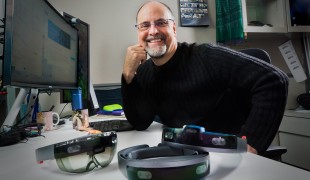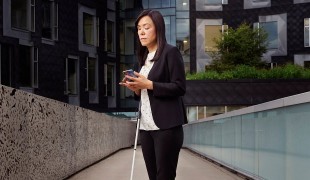- 7475
- 535
- 6
- 16
- 0
- Help Ukraine
About the solution
Many visually impaired students from India struggle to find inclusive schools to pursue their education. The main reason relies on the lack of resources of the education system that miss giving these students the support they need. Lack of education affects also employability of visually impaired people. To overcome the social challenges stemmed by a weak education system, a team of recent graduates, Akshita, Bonny, and Abhishek, developed ‘Kibo’ to help the visually impaired access written content.
The team met at the Digital Impact Square centre where graduates are trained to create social innovations. Because of previous volunteering experience, Akshita, Bonny, and Abishek already had some ideas on how to help visually impaired people. However, “as part of the project, we spent around eight months interacting with the visually-impaired from all age groups across five cities. A lot of our assumptions and doubts were cleared. It was an enriching experience for all of us,” said Abhishek. The turning point that led them to develop Kibo was the daughter of a blind couple. The visually impaired parents administered to their daughter an expired medicine because they were not able to read the expiration date, in turn, their daughter had a bad reaction to the medicine.
Kibo is composed of a low-cost portable device and an application able to scan and read aloud printed, handwritten, and digital text. The scanner can translate the text in over 100+ languages. The Kibo web-portal ensures the device's compatibility with laptops and PCs. “We received a lot of feedback from our users. One of the biggest criticisms was the device translating only English books. For the next couple of months, we worked on integrating several regional languages like Gujarati, Marathi, Bengali, Tamil and Telugu,” said Bonny.
“Through the audio files, the self-learning process became very easy. I am confident now, more than ever, to clear my third year,” a student using Kibo said.
The team founded the company Trestle Labs in 2017 to promote inclusivity and accessibility. Trestle Labs now has a wide range of clients, from NGOs, libraries, and universities like Indian Institute of Management-Ahmedabad.
Adapted from: https://www.thebetterindia.com/189988/lifestyle-india-innovation-visuall...
More information: https://trestlelabs.com/
这些解决方案不应包括使用药物,化学品或生物制品(包括食品);创伤性设备;冒犯性的,商业或内在危险的内容。该解决方案未经医学验证。请谨慎进行!如果您有任何疑问,请咨询健康专家。
DISCLAIMER: This story was written by someone who is not the author of the solution, therefore please be advised that, although it was written with the utmost respect for the innovation and the innovator, there can be some incorrect statements. If you find any errors please contact the patient Innovation team via info@patient-innovation.com
-
-
400
-
0
-
4467

Using AI to allow blind people to find familiar faces
COMMUNICATION: Communicating, whether by speaking, listening, or other means
Social interaction
Blindness
5 Senses support devices: (glasses, hearing aids, headphones...)
Body-Worn solutions (Clothing, accessories, shoes, sensors...)
App (Including when connected with wearable)
AI algorithm
Assistive Daily Life Device (to help ADL)
Difficulty communicating with environment
Confusion
Regaining sensory function
Promoting self-management
Promoting inclusivity and social integration
Improving Speech and Communication
Raise awareness
Ophthalmology
Pediatrics
United States
-
-
-
514
-
0
-
6874

Blind woman develops several technologies to help the blind
CAREGIVING
Reading
Studying
COMMUNICATION: Communicating, whether by speaking, listening, or other means
Blindness
Assistive Daily Life Device (to help ADL)
Assistive Technology access
Vision problems
Recovering cognitive function
Promoting self-management
Preserving Organ Function
Managing Neurological Disorders
Promoting inclusivity and social integration
To improve Treatment/Therapy
Preventing (Vaccination, Protection, Falls, Research/Mapping)
Ophthalmology
United States
-
-
-
370
-
0
-
4721

Memory Lane Games - Reigniting memories for those with Dementia & Alzheimer's
CAREGIVING
COMMUNICATION: Communicating, whether by speaking, listening, or other means
Alzheimer's Disease
App (Including when connected with wearable)
Videogame
Memory loss
Recovering cognitive function
Promoting self-management
Managing Neurological Disorders
Building Supportive Community Relationships
Promoting inclusivity and social integration
Enhancing Mental Health
Improving Speech and Communication
To improve Treatment/Therapy
Preventing (Vaccination, Protection, Falls, Research/Mapping)
Raise awareness
Caregiving Support
General and Family Medicine
Neurology
United Kingdom
-
 zh
zh